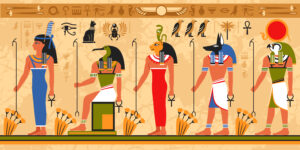In Israel, 31st December celebrations are known as the holiday of “Sylvester”. Only a handful of other countries in the world celebrate New Year’s Eve by this name, and whilst it’s great as believers to celebrate the number of years since Yeshua our Messiah came to live among us, Sylvester is something many Jews feel ambivalent about. Israelis love to party, but some feel uneasy joining in the global jubilation.
Why is New Year’s Eve controversial in Israel?
The abbreviations BC and AD (Before Christ and Anno Domini – the year of our Lord) are hard to swallow for most Jewish people, for whom Yeshua is a blot on the historical landscape and definitely not their Lord. In Hebrew, we talk about years before “the counting” and years of “the counting” without mentioning what (or who) started this whole Western counting business. It is not a calendar markation system that many Jewish people are comfortable with, mostly because the followers of “that man” brought so much persecution for Jews.
I had never heard the name Sylvester used in connection with New Year’s Eve before I moved to Israel. For me, Sylvester was a black and white cartoon cat, overly fond of a bird called tweetiepie. But I realised that “Sylvester” parties made many Jewish people feel conflicted and that I needed to understand why. On one hand, Israel is relentlessly marching towards secular Westernisation and so Western celebrations are being embraced more and more… but even though many Israelis, Arab Christians, Russians and Jews alike join in with the partying, Sylvester still makes a lot of Jewish people flinch a bit.
It is not only that the calendar declares the unforgettable and permanent impact of Yeshua (they call him “Yeshu”, which stands for “may his name be forgotten and obliterated completely” – an ungrantable wish) but it is called Sylvester after one of the first ever popes, who, it turns out, was a pretty unhelpful character.
Who was Sylvester?
Sylvester I was the bishop of Rome from January 314 to December 335. Very little is known about him factually, although there are all sorts of myths and legends involving dragons and the like. Fairy tales aside, it is an established fact that he was close to Constantine, the Roman Emperor at the time, and that he oversaw and sent delegates to the first Nicean Council in 325 [1]. The first Council of Nicea is famous for the creed that was agreed upon, establishing the Christian position on the deity of Jesus, and other important beliefs. But it was also the time when commemorating Yeshua’s death and resurrection was officially torn away from the Jewish Passover. Easter was divorced from Passover. This is a tragedy of epic proportions. It has become all the harder for Jewish people to see how Yeshua is a perfect fit for all that the Jewish scriptures prophesy and lead up to. Equally, it severed Christians from their Jewish roots, like leaving the family home and not looking back.
Moreover, this Sylvester / Constantine era saw the politicization of faith in the Messiah. Christianity became the State religion, and it became more dangerous not to believe than to believe. Rather than being persecuted, the church became the persecutors, with all the power of the Roman Empire behind it. And who did they persecute? Among others, the Jewish people. Many outrageous, anti-Semitic laws were passed at this time, under the watch of “Saint” Sylvester, prohibiting Jews from having the same freedoms and rights as others, and even banishing them from Jerusalem.
As the tradition of honoring Sylvester continued throughout the years, December 31st became a very dangerous night for Jewish people.
Rochel Sylvetsky recalls that her father would join the rabbinic tradition of forbidding studying Torah or making a noise on that night.
“He explained that this was a silent night, made so by the Eastern European Jews who lived in fear of the yearly pogroms that accompanied the ushering in of the what is the civil new year today. This evening was… a call for the local peasants to engage in drinking, making merry and killing Jews.”[2]
Not so fun for everyone
An historical overview of New Year’s Day from News and World Report tells us that,
- On New Years Day 1577 Pope Gregory XIII decreed that all Roman Jews, under pain of death, must listen attentively to the compulsory Catholic conversion sermon given in Roman synagogues after Friday night services.
- On New Years Day 1578 Gregory signed into law a tax forcing Jews to pay for the support of a “House of Conversion” to convert Jews to Christianity.
- On New Years 1581 Gregory ordered his troops to confiscate all sacred literature from the Roman Jewish community.
“Thousands of Jews were murdered in the campaign. Throughout the medieval and post-medieval periods, January 1… was reserved for anti-Jewish activities: synagogue and book burnings, public tortures, and simple murder.”
Easter too became a time when Jewish families lay low in the dark, huddling behind barricaded doors, and hoping that they would escape the outpourings of anti-Semitic fury that often accompanied such Christian holy days.
With the message of Yeshua the Messiah coming through messengers like these, is it any wonder that the Jewish people have had difficulty hearing it?
The enemy has worked overtime to build the barriers high and strong to prevent God’s chosen people from seeing their Messiah, but his opponent is far stronger. Satan is no match for the God of Israel.
But the tide is turning!
Today there are around 30000 Messianic believers in Israel. In 1948 there were only about 20 Jewish people in Israel who counted themselves followers of Yeshua, but this number has roughly tripled every decade. Messianic congregations are springing up across the land, and God is doing mighty wonders. God is on the move in Israel among his own. The enemy has done great damage to turn Jewish people away from Jesus, but nothing is too hard for the Lord. Just as many Israelis are now joining in the New Year’s celebrations these days, so old prejudices against Yeshua are starting to fall away.
Many Messianic pastors and organisations are reporting a sharp interest in the gospel, and we too at One for Israel are seeing amazing responses to our evangelistic videos and websites. At the end of this year, we’re delighted to tell you that our videos have been watched almost 90 million times! Israel has a population just over 9 million people, but our Hebrew language videos about the gospel, and personal stories of how Israeli believers found their Messiah, have also been watched many millions of times! We receive messages from Israelis touched by the truth of Yeshua writing in to us daily.
Please join with us in praying in the harvest! The fields are white and ready, but we need your prayers and support. We are believing God for even greater things this year, and for many more Jewish people to come to faith in the one who split time in two.
For more study articles, videos and up to the minute ONE FOR ISRAEL news
follow us on
Facebook, Twitter, Instagram, YouTube
or subscribe to our blog and newsletter!
[1] Encyclopedia Britannica
[2] Rochel Sylvetsky, israelnationalnews.com, 31/12/17
















